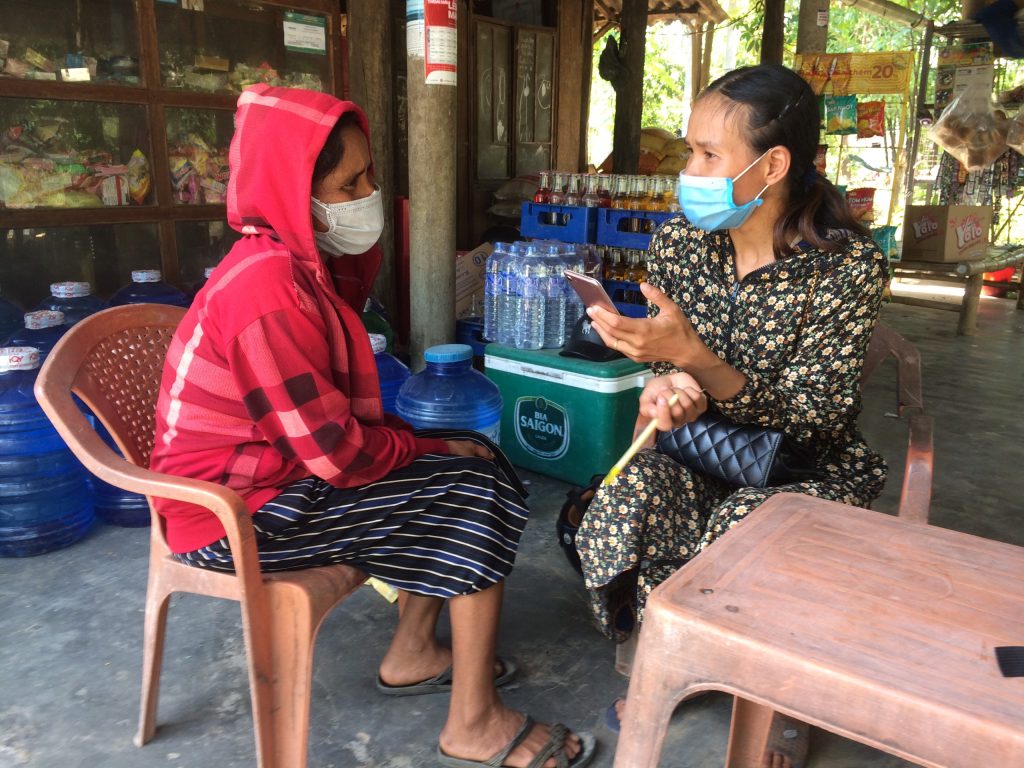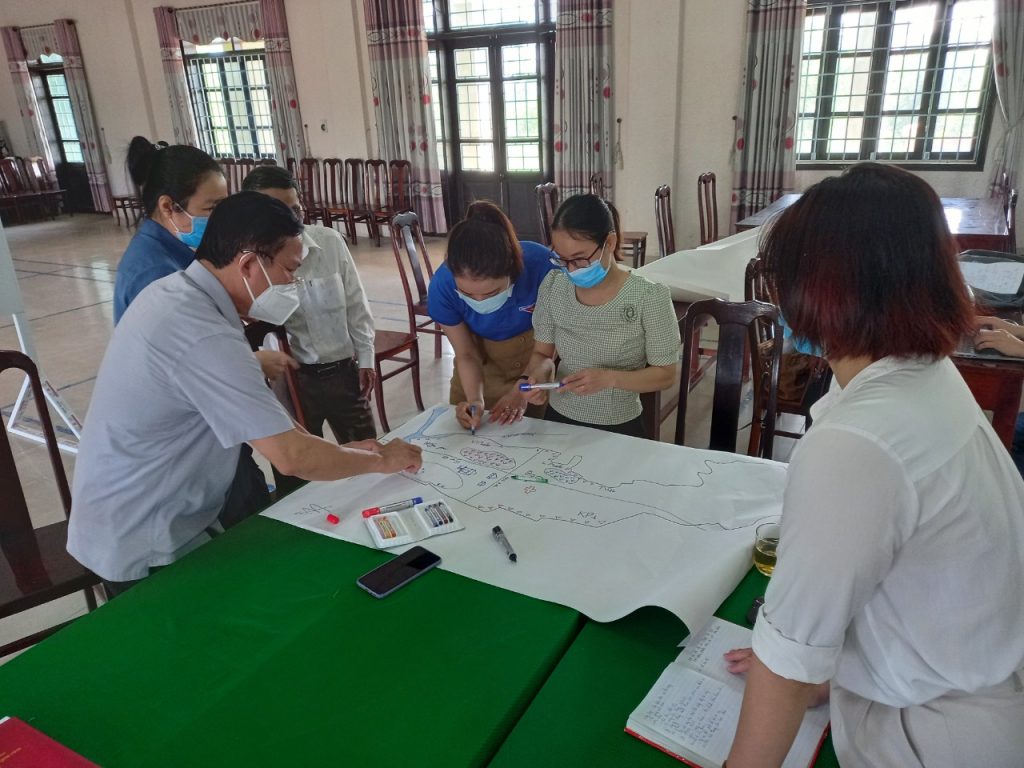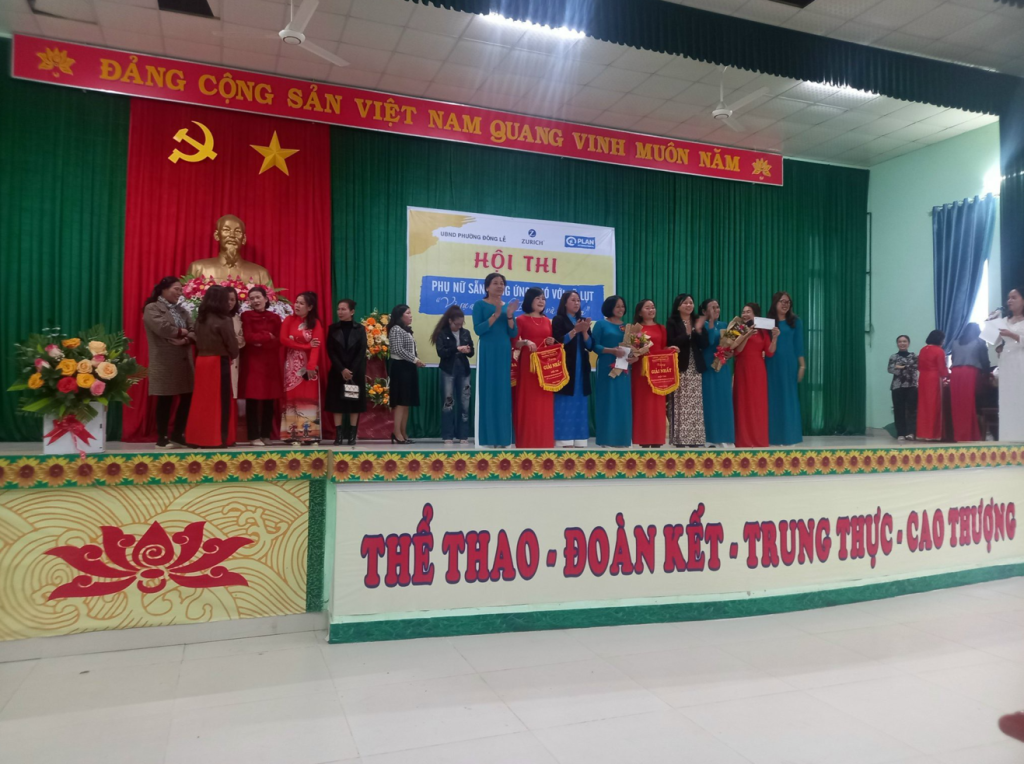Because of cultural barriers, women’s participation in flood resilience is very low in Vietnam. As a member of the Zurich Flood Resilience Alliance, Plan International works with women from 18 communities, empowering them to take on leading roles in the decision-making bodies of their communities.
In Vietnam, flooding – especially due to flash floods and coastal floods – is responsible for around two-thirds of all deaths and significant economic losses associated with natural hazards in the country.
To help mitigate its negative effects, Plan’s work is guided by the Flood Resilience Measurement for Communities (FRMC) approach. We apply the FRMC to understand, from the perspective of community members, the current obstacles to flood resilience in their context and how to tackle them.
What are the barriers to women’s participation?
Vietnam ranks 83rd (out of 146 countries) on the World Economic Forum’s Global Gender Gap Index for 2022. Less than 30% of seats in parliament are held by women. Their limited decision-making power is a key constrainer to development. Increasing women’s participation leads to stronger, healthier, and more resilient societies (EarthForAll, 2022).
Women’s participation in flood resilience is indispensable; they have key knowledge about the specific needs of their communities, and should therefore participate in discussions around risk reduction measures that concern them. Yet around the world, women are often excluded from decision-making – and Vietnam is no exception. At the community level, women’s opinions are often not considered in local response committees. An important step towards enhancing flood resilience is therefore to increase the participation of women within these committees.
The number of women that participate in decision-making bodies is small (26.7% at the national level, 26.8% at the local level). This matches information collected during our FRMC baseline study, according to which only about 25% of women in the project communities participate in local response committees.
According to Vietnamese culture and customs, women are primarily responsible for taking care of the family. This cultural context creates another barrier for women’s participation in different areas of society, especially in predominantly rural and economically poor areas of the country like Quang Tri.
This explains why women in Quang Tri province are mainly responsible for simple prevention and response measures at the household level (e.g. storing food and medicine, cleaning the house after the flood, and taking care of the children and the elderly). They rarely participate in planning and decision-making processes regarding flood resilience concerning their community. While women possess a lot of local knowledge based on their experience of living with the flood risk, this is often overlooked and insufficiently taken into consideration because of women’s limited participation beyond the household level.
In families, the women are the ones who mobilize relatives to protect themselves against floods. Women provide logistical support before the floods, and while recovering from them. They are also sensitive enough to protect the vulnerable. At the same time, they are also good at financial management. Thus, it is important that they are involved in decision-making on issues related to floods.
Ms. Luu Thi Thuy, trained field worker from the Trieu Long Community, Quang Tri province

Raising women’s voices in Vietnam and beyond
As a member of the Alliance, Plan aims to empower women through a range of activities; for example, by working on flood resilience and menstruation education for young people in El Salvador. Meanwhile in Nicaragua, Plan has helped women to break the traditional gender roles of managing the flood risk in their communities. In Vietnam, Plan has organized seminars in which focus on women’s participation in flood resilience building, and has also strengthened women’s first aid skills, so that they can attend to immediate needs during an emergency.
Across all countries, we are capturing women’s lived experiences and perspectives through community consultations in addition to men’s, including through ‘women only’ focus groups. Our target is to achieve the participation of at least 40% female participants in local response committees by the end of the project. Last but not least, Plan ensures that women’s experiences are captured during the data collection process to inform subsequent project activities.
I learned more about floods, including first aid skills and techniques as well as methodologies for evaluating early warning systems and disaster risk assessments. I’ve developed my ability to respond to disaster risks, as well as my interviewing, public-speaking, teamwork, and communication skills. I am particularly aware of the critical role that communication plays in raising public understanding of flood protection, so that individuals can take greater initiative when responding to floods
Ms. Truong Thi Hoa, trained field worker from the Huong Hiep community, Quang Tri province

The power of performance
To raise awareness of the importance of women’s participation in flood resilience practices, Plan organized a contest in Quang Tri. People from the 18 project communities were invited to inform the audience about the flood risk in their communities – and the role of women therein – in the form of theatre acts. The event was facilitated by Plan but otherwise conducted by the women from the project communities themselves, and featured the participation of hundreds of people, including local government representatives. Participants joined in groups to develop short theatre sketches about topics related to flood resilience. They had time to rehearse them, before performing on stage in front of a public audience.
For example, in one of the sketches, a woman informed her fellow community members about a flood, telling them how and where to evacuate. This sketch was aimed at demonstrating that women can take up leadership roles within local response committees. Once all the groups had presented their sketches, the event’s ‘judges’ graded the acts and awarded a winner, after which the audience was given the opportunity to ask questions related to the project, the event and the theatrics.

Most of the participants would not normally have had access to basic information about flood resilience practices. Through the event, they were able to learn more about this topic in an entertaining way. In particular, the contest helped draw the participants closer to the topic of women’s participation in flood resilience practices.
Empowering women helps to erode cultural barriers that impede women’s participation in decision-making. For the project to be a success, it is necessary to encourage and support women to take an active role in project activities. Doing so helps change the role of women within their communities, and offers them more possibilities for their personal and professional development.
To find out more about the work of the Alliance in Vietnam, visit our country page or read our country brief

Susy Krisch says:
Excellent proyect. Empowering woman is definetely an effective way to improve community development bcs it also changes the men’s view of women’s role in society.